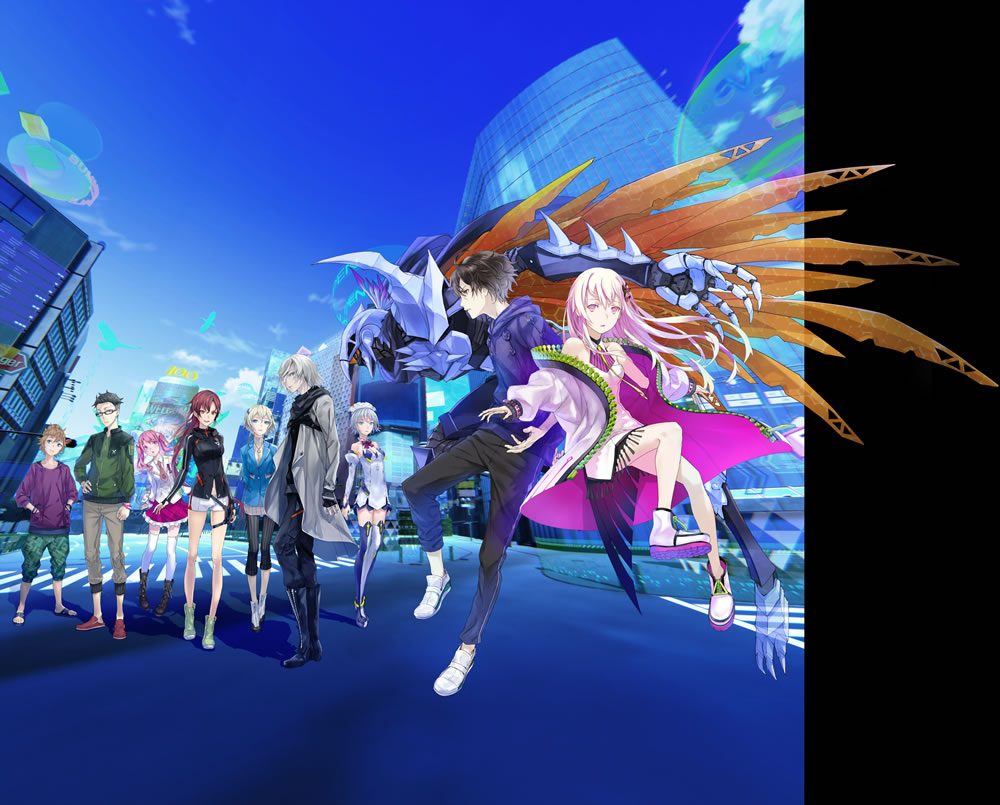Archiving Japanese electronic games is underway. Currently, the target is early types of video games alone, and there is no prospect for archiving more recent online games and mobile games, which have been widespread since the late 1990s. The Japan Game ScenarioWriters Association (JAGSA), a general incorporated association, has started a project to archive scenarios for smartphone games for public use. This article will focus on the project and its significance.
 LayereD Stories 0 key visual © BANDAI NAMCO Entertainment Inc.
LayereD Stories 0 key visual © BANDAI NAMCO Entertainment Inc.
Online games: An unexplored repository hard to archive
Efforts to archive video games released in various formats have been continuing not only overseas but also in Japan to use them as a resource for academic research and cultural activities. For example, pioneering examples in Japan include the Game Archive Project (in Japanese) by Ritsumeikan University that started in 1998, and collection and preservation of video games by the Game Preservation Society, a nonprofit organization established in 2011.
Those projects mainly target works distributed on packaged media such as ROM cassettes and magnetic/optical media for home video game consoles and PCs after the 1980s. Such works are also possessed by private collectors and public institutions such as the National Diet Library. Thus, the methodology for archiving those types of works has already been established, even though it has many issues to be addressed.
On the other hand, it is still difficult to have a realistic prospect for archiving online games and mobile games, whose markets were formed after the Internet emerged in the latter half of the 1990s. In these types of games, for early titles for PC, sales packages of client software exist as physical media, but the main body of each game program is stored in the game host’s server. That is, if the game service is terminated and its program is deleted from the server, the environment for playing the game is lost forever.
In fact, when conducting research on the history of video games, it is much more difficult to find out, for example, what kind of app games and network games for feature phones were released in the early 2000s, than to find out what kind of standalone titles were released in older years.
Considering those characteristics of online games provided under the games as a service (GaaS) continuing revenue model, it is doubtful whether they are compatible with the archival concept for packaged media that includes “preserving” and “collecting” game titles, in the first place. In order to archive them, the only way would be to give some kind of incentive to cause game business operators to directly provide their developed assets for the sake of the public, unlike building up collections of products, such as home video games and arcade games, that were provided to the users.
Methodology and background of achieving ‘game scenarios’
As a move to tackle the structural difficulty of the methodology for preserving online games, in September 2019, the general incorporated association Japan Game ScenarioWriters Association (JAGSA) announced launching the “Game Scenario Archive” project (in Japanese). This project was initiated by the scenario writers’ industry organization with the aim of preserving game scenarios for future generations in a form enabling them to be viewed even after their playable environments are lost because their services are terminated
or for other reasons. Game scenarios have become an important creative element, especially for online RPGs for smartphones in recent years.
As the project’s first archived work, the entire scenario text of LayereD Stories 0 is now available on the Internet in pdf format. LayereD Stories 0 is a smartphone game distributed by BANDAI NAMCO Entertainment Inc. from December 2017 to January 2019. The game was produced as part of the “Minna de game wo tsukuro” (Let’s make a game together) project. For the project, character designers, voice actors, theme song vocalists and other artists were recruited through auditions based on its cross-media development plan involving its anime and manga versions. The objective contributed to more appropriately preparing the framework and rules regarding the participation of outside creators from the production stage. Scenario writers involved in the work, driven by the idea that it’s a shame to lose the opportunity to have their work better known, asked the operator of this game business, BANDAI NAMCO Entertainment Inc., to archive the scenario text for public use. The request was realized, in the unusual form for an online game.
 Characters from LayereD Stories 0 © BANDAI NAMCO Entertainment Inc.
Characters from LayereD Stories 0 © BANDAI NAMCO Entertainment Inc.
Lying behind the request of this type of scenario archiving project is the popularity of Japanese mobile games, especially for smartphones and the type that develops as a grand saga, such as Chain Chronicle (2013–) and Fate/Grand Order (2015–). The popularity resulted in producing a growing amount of game scenarios for long-running games provided under the GaaS model. In response to the consequent growing demand for game scenarios, scenario writers, usually freelancers or small businesses, established JAGSA as an incorporated association to support their work by dealing with such matters as social insurance coverage. Ever since, the association has carried out various activities in the public’s interest within a nonprofit framework, such as handling copyright and tax-related paperwork, and giving lectures to young members to share the scenario production know-how.
Under the circumstances, there was a growing sense of danger that, with the exception of a handful of successful titles, online titles, which do not have a package to remain, could easily be lost for their publishers’ reasons, which means works by scenario writers may become inaccessible and sink into oblivion. They put their heart and soul into creating those works, usually despite insufficient backing by employment. In some cases, finished and delivered scenarios are not used and never given a chance of release, either. Thus, the archiving project has been conceived and proposed, particularly for scenarios of online games, also for the purpose of protecting the careers and achievements of scenario writers.
It should be noted that as stated in the project’s gist on its website, game scenarios are not meant to function on their own, but are created on the premise that they are appreciated in game playable environments, which also involve visuals, audio, interfaces on devices, and mechanics of playing the games. In this respect, making game scenarios alone accessible to the public is similar to the documentation of game development materials, such as the Namco Development Document Archive Project, rather than the ongoing library-type archiving of finished products, which are standalone games.
Unlike scripts for movies or TV dramas that are meant to be performed, game scenarios, similar to novels, are characterized in that their written texts themselves usually can also be presented to the user as finished products, even though they are often read aloud by voice actors as supplementary performance. Archiving game scenarios has other values, too. For example, it takes a great deal of time to read a game’s whole story in its playable environment, especially for online games under the GaaS model. If it is made possible by an official project to extract and easily view only the scenario of a certain game, it will provide a useful material for critics and researchers to analyze its story. In addition, its value as a pure end-user content can also be expected.
In this sense, game scenarios have two contrasting, almost equally remarkable characteristics: they are merely an element of video game development materials, while having an independent value almost of a finished product.
Current issues and future prospects
Ironically, having the value can be an obstacle to archive game scenarios for public use. In other words, game scenarios themselves have potential as profitable content, having a different type of business chance from selling games. In fact, in some of the games that used to be available and are not provided now, fan items themed on their scenarios were produced after providing the games were terminated, resulting in a profitable business. A successful example is Aniplex Inc.’s Band Yarouze! of which service ended in March 2019. Considering the potential, in order to make the archiving of game scenarios a universal practice, it will be necessary to include an option of stopping free publication of game scenarios at the request of their intellectual property right holders want to stop it, for the purpose of facilitating their use of the scenarios for commercial benefits.
Here, let’s look at this matter from the opposite side. Suppose archiving scenarios of terminated games becomes an established practice in the industry with the initiative of scenario creators, as the number of game titles increases, there are more possibilities that these games may be popular again through their fanfiction works by viewers of archived game scenarios, leading to, for example, their commercial publication. It can be incentives hard to overlook for game developers and publishers to cause them make at least a minimum amount of investment in the archiving.
JAGSA representative SHIGEMA Kei, who originated the idea of the Game Scenario Archive project and a game scenario writer himself, says that game scenarios should be experienced through playing games, so it would be ideal to pave the way for ultimately making a playable archive. Of course, preserving, in a playable state, archived epic online game titles that require long time to play their entirety will be a much more difficult project regarding cost and methodology. Take a game with full voice acting, for example. A contract is usually concluded with each voice actor for using their performance only in the game. Releasing an archived version is categorized as secondary use in terms of contract management, and as a consequence, cost for negotiation with each voice actor would be incurred. It would be difficult to realize such a project without substantial support by public money or game companies’ out-of-pocket payments.
As a first major step to help realize such a playable archive project, it is expected to cultivate and spread, through educating game business operators, the culture of preparing at least game scenarios in a format suited for archiving when providing their games is terminated. Game scenarios need little cost for archiving and can be released basically by simply formatting their text data.
Game scenario writers require game developing staff to store the fixed version of a scenario text in a released game’s program with always extracting and reflecting relevant data on ordinary spreadsheet, etc., so that the fixed version can be appropriately retrieved later. They simply wish that the staff would not forget to do this “small step” to properly manage their business assets before the game production team dissolves.
As described above, the Game Scenario Archive project is a step toward such a highly cost-effective archiving in the age of online games, quietly raising an important issue to improve the current situation. It is hoped that the initiative, which is based on the unique characteristics of Japanese mobile games, will be earnestly accepted by many game business operators and people concerned, and will spread as widely as possible.
*URL links were confirmed on April 5, 2021.











